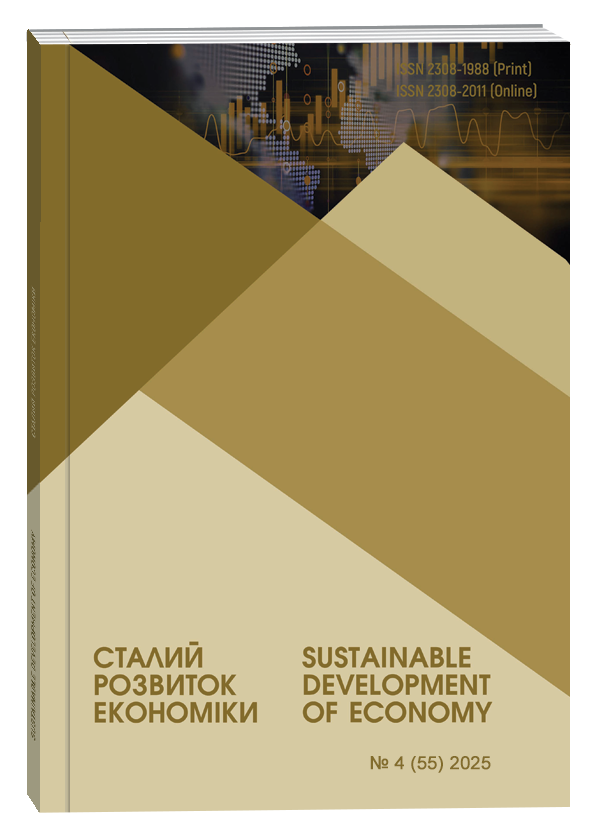PRIORITY AREAS FOR ACHIEVING SUSTAINABLE DEVELOPMENT GOALS IN THE CONSTRUCTION SECTOR
Abstract
The construction sector is very important for achieving the Sustainable Development Goals. This is especially relevant in light of today's global challenges, such as climate change, increasing urbanization and the ever-increasing demand for resources. The article is devoted to the study and justification of priority areas that are critically important for the integration of sustainable development principles into the construction industry. The construction industry has a profound impact on our environment, society and economy, which is why its transformation is critical to its long-term health and meeting global commitments. The aim of the work is to identify and conduct a detailed analysis of the key SDGs that are most relevant to construction activities, as well as to identify strategic areas for their effective implementation. The research utilizes a systematic methodology to analyze the multifaceted interplay of environmental, social, and economic factors that contribute to sustainable development, with a specific focus on the construction industry. The main conclusions of the study are the identification of three interrelated priority areas and the corresponding SDGs: for environmental sustainability, the focus should be on energy-efficient solutions, sustainable materials, waste reduction, and resilient infrastructure that can handle climate impacts; social justice, which requires ensuring safe working conditions, decent pay, affordable housing and an inclusive urban environment; economic efficiency, which emphasizes the need for investment in innovation, building sustainable infrastructure and developing partnerships to jointly achieve goals. The practical value of this study's findings is in providing a comprehensive framework for understanding how to prioritize and integrate the Sustainable Development Goals into the strategic management of construction companies. This framework can serve as a guide for companies aiming to boost their competitiveness and investment appeal, while also making a substantial contribution to societal sustainable development and environmental protection.
References
Благун І., Кукурудз Н., Чмелик В. Циркулярна економіка як інструмент досягнення цілей сталого розвитку. Наукові інновації та передові технології. 2025. № 5(45). DOI: https://doi.org/10.52058/2786-5274-2025-5(45)-605-617
Гладушевська А. Сталий розвиток у будівництві: модна тенденція чи потреба задля збереження людства. Український центр сталевого будівництва. URL: https://uscc.ua/news/stalij-rozvitok-u-budivnictvi-modna-tendencia-ci-potreba-zadla-zberezenna-ludstva (дата звернення: 10.07.2025).
Державна служба статистики України. Державна служба статистики України. URL: http://www.ukrstat.gov.ua/ (дата звернення: 10.07.2025).
Ємельянова О., Титок В., Пилипчук О. Аспекти соціальної відповідальності та сталого розвитку будівельної компанії. Вісник Хмельницького національного університету. Економічні науки. 2024. Т. 330, № 3. С. 165–171. DOI: https://doi.org/10.31891/2307-5740-2024-330-24
Індикатори цілей сталого розвитку. Indicators For The Sustainable Development Goals. URL: https://sdg.ukrstat.gov.ua/uk/ (дата звернення: 10.07.2025).
Олійник О. В., Легенчук С. Ф., Юрківська О. Д. Циркулярна економіка як основа сталого розвитку підприємства: обліковий аспект. Економіка, управління та адміністрування. 2025. № 4(110). С. 54–62. DOI: https://doi.org/10.26642/ema-2024-4(110)-54-62
Станкевич І.В., Мальованний О.В., Сакун Г.О. Вплив соціальної відповідальності бізнесу на ефективність управління: сучасні аспекти. Сталий розвиток економіки. 2024. № 1(48). С. 41-46. DOI: https://doi.org/10.32782/2308-1988/2024-48-5
Тарасюк О. В. Теоретичні засади формування концепції сталого розвитку та її практична реалізація на сучасному етапі розвитку суспільства. Економіка, управління та адміністрування. 2025. № 1(111). С. 51–63. DOI: https://doi.org/10.26642/ema-2025-1(111)-51-63
International business strategy: ensuring enterprise stability amidst turmoil / A. Tanasiichuk et al. European journal of sustainable development. 2024. Vol. 13, no. 2. P. 278. DOI: https://doi.org/10.14207/ejsd.2024.v13n2p278
Assessment of the impact of social responsibility of integrated business forms on regional development / I. Stankevych et al. Proceedings of the ICAIIT: applied innovations in IT. 2024. Vol. 12, no. 2. P. 245–252. DOI: https://doi.org/10.25673/118139
Blahun, I., Kukurudz, N., & Chmelyk, V. (2025). Tsyrkuliarna ekonomika yak instrument dosiahnennia tsilei staloho rozvytku [Circular economy as a tool for achieving sustainable development goals]. Naukovi innovatsii ta peredovi tekhnolohii - Scientific innovations and advanced technologies, (5(45)). DOI: https://doi.org/10.52058/2786-5274-2025-5(45)-605-617 (in Ukrainian)
Hladushevska, A. (2025, April 29). Stalyi rozvytok u budivnytstvi: Modna tendentsiia chy potreba zadlia zberezhennia liudstva [Sustainable development in construction: a fashionable trend or a necessity for the preservation of humanity]. Ukrainian Steel Construction Center. Available at: https://uscc.ua/news/stalij-rozvitok-u-budivnictvi-modna-tendencia-ci-potreba-zadla-zberezenna-ludstva (in Ukrainian).
Data Bank. (n.d.). Derzhstat. Available at: https://stat.gov.ua
Yemelianova, O., Tytok, V., & Pylypchuk, O. (2024). Aspekty sotsialnoi vidpovidalnosti ta staloho rozvytku budivelnoi kompanii [Aspects of social responsibility and sustainable development of the construction company]. Visnyk Khmelnytskoho natsionalnoho universytetu. Ekonomichni nauky - Herald of Khmelnytskyi National University. Economic Sciences, Vol. 330, no. 3. P. 165–171. DOI: https://doi.org/10.31891/2307-5740-2024-330-24 (in Ukrainian)
Sustainable Development Goals Indicators (n.d.). Indicators For The Sustainable Development Goals. Available at: https://sdg.ukrstat.gov.ua/uk/
Oliinyk, O. V., Lehenchuk, S. F., & Yurkivska, O. D. (2025). Tsyrkuliarna ekonomika yak osnova staloho rozvytku pidpryiemstva: oblikovyi aspect [Circular economy as a basis for sustainable development of an enterprise: accounting aspect]. Ekonomika, upravlinnia ta administruvannia - Economics, management and administration, No. 4(110). P. 54–62. DOI: https://doi.org/10.26642/ema-2024-4(110)-54-62 (in Ukrainian)
Stankevych, I., Malovannyi, O., & Sakun, H. (2024). Vplyv sotsialnoi vidpovidalnosti biznesu na efektyvnist upravlinnia: suchasni aspekty [The impact of business social responsibility on management efficiency: modern aspects]. Stalyi rozvytok ekonomiky - Sustainable Development of Economy, No. 1(48). P. 41–46. DOI: https://doi.org/10.32782/2308-1988/2024-48-5 (in Ukrainian)
Tarasiuk, O. V. (2025). Teoretychni zasady formuvannia kontseptsii staloho rozvytku ta yii praktychna realizatsiia na suchasnomu etapi rozvytku suspilstva [Theoretical foundations of the formation of the concept of sustainable development and its practical implementation at the current stage of society's development]. Ekonomika, upravlinnia ta administruvannia - Economics, management and administration, No. 1(111). P. 51–63. DOI: https://doi.org/10.26642/ema-2025-1(111)-51-63 (in Ukrainian)
Tanasiichuk, A., Kovalchuk, S., Sokoliuk, S., Kovtun, E., Dodon, O., Sakun, H., & Serednytska, L. (2024). International business strategy: ensuring enterprise stability amidst turmoil. European journal of sustainable development, Vol. 13, no. 2. P. 278. DOI: https://doi.org/10.14207/ejsd.2024.v13n2p278
Stankevych, I., Yatskevych, I., Sakun, H., Shyriaieva, N., Vasylenko, O., & Siemens, E. (2024). Assessment of the impact of social responsibility of integrated business forms on regional development. Proceedings of the ICAIIT: Applied Innovations in IT, Vol. 12, no. 2. P. 245–252. DOI: https://doi.org/10.25673/118139


